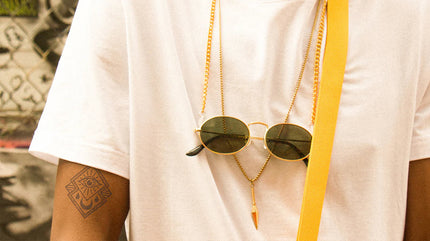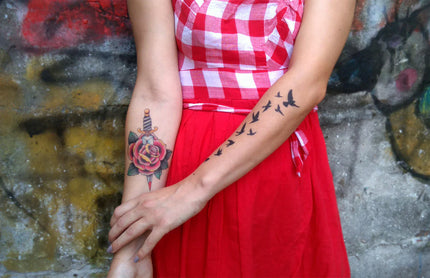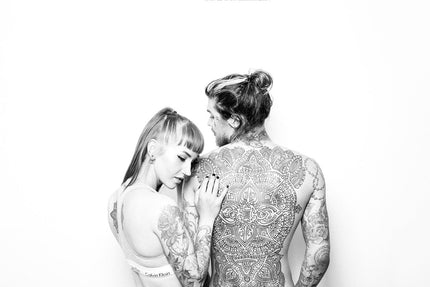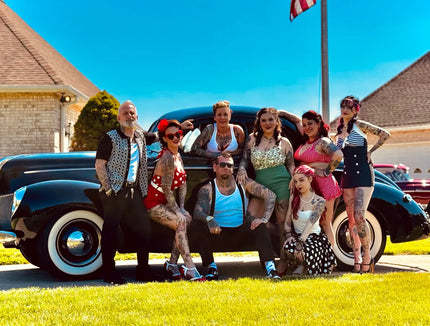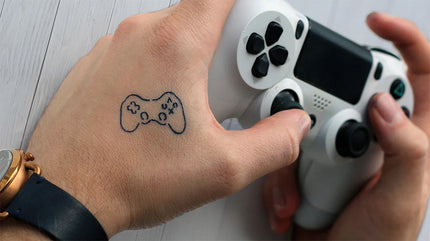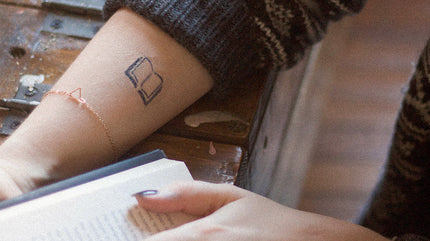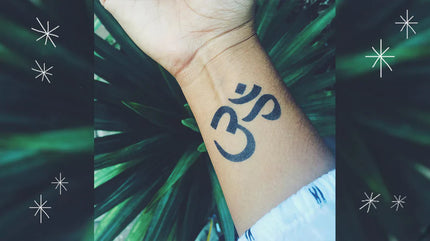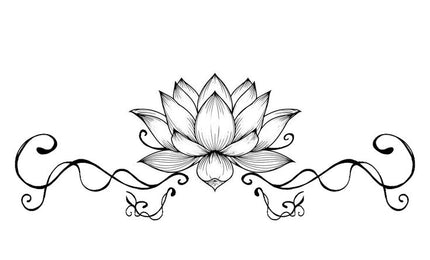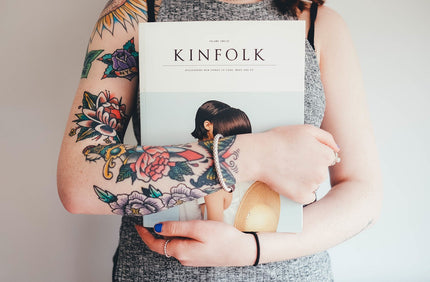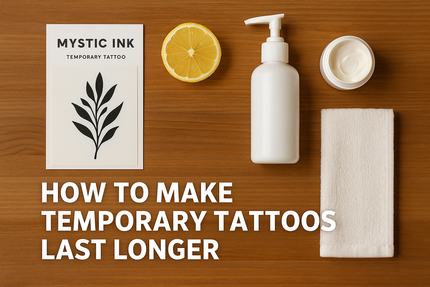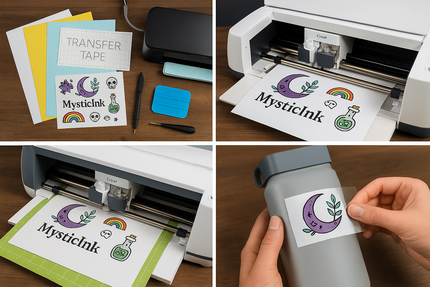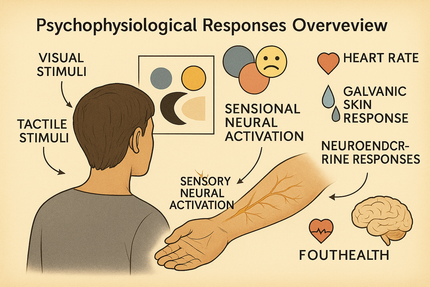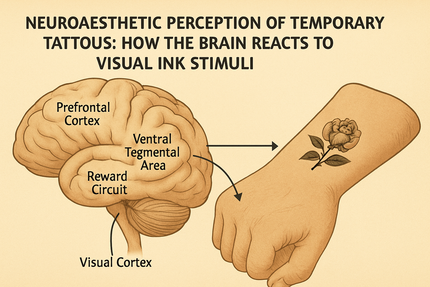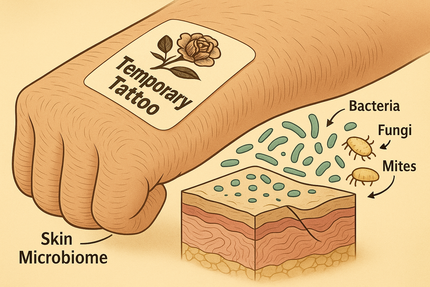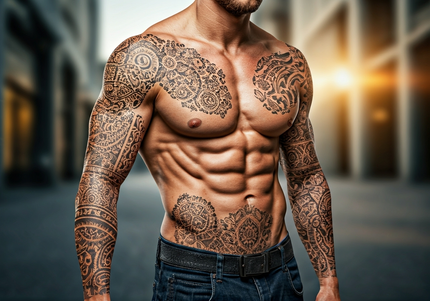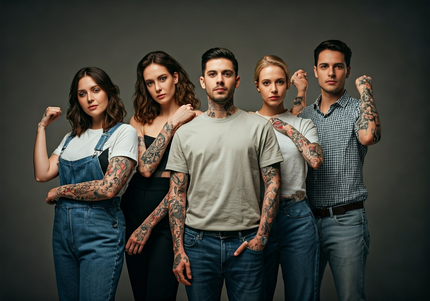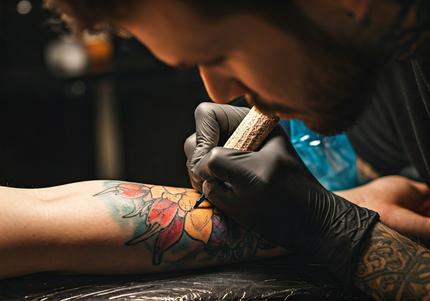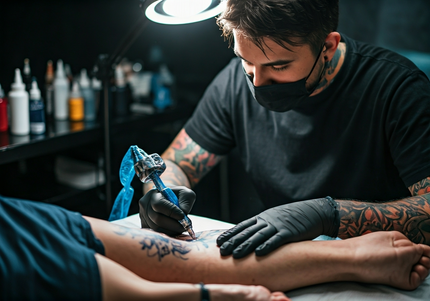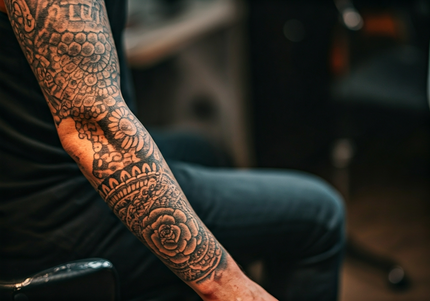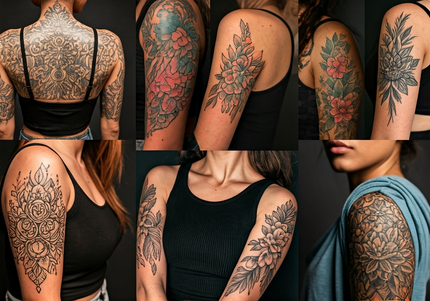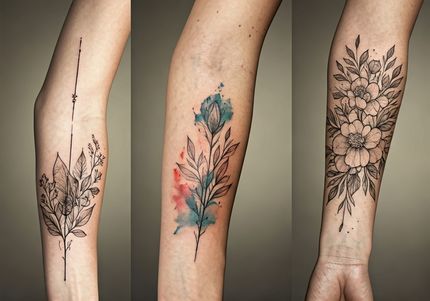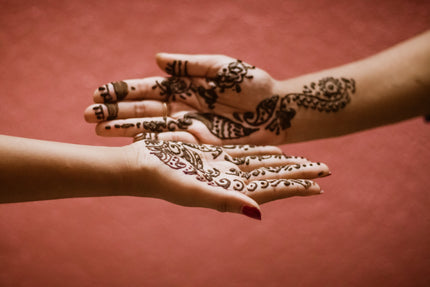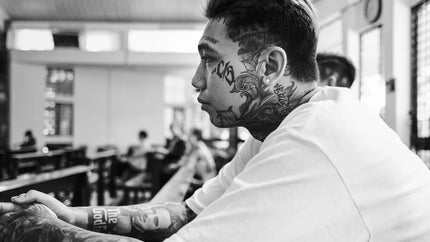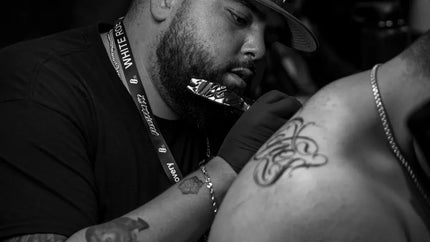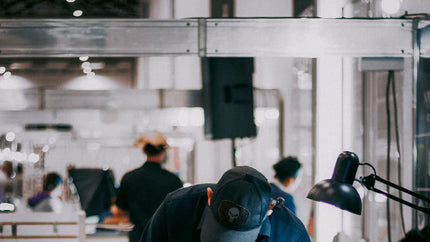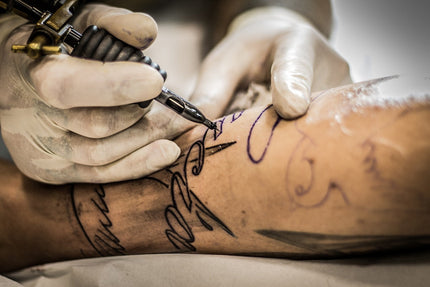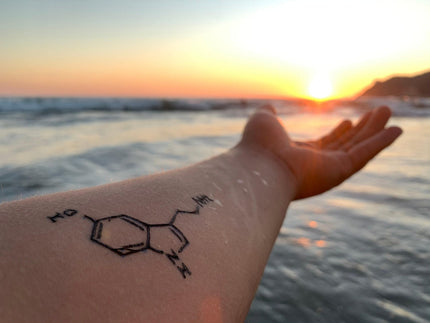Key Highlights
Key Highlights:
Ensuring safety during the tattoo process is crucial for a healthy experience and long-lasting results.
Choosing a reputable tattoo studio with certified artists significantly reduces risks of complications.
Maintaining proper hygiene practices, including sterilization and the use of disposable equipment, is essential for infection prevention.
Understanding individual health considerations, especially for those with sensitive skin or medical conditions, is key before getting inked.
Aftercare plays a vital role in the healing process and should not be overlooked for optimal results.
Introduction
In the past few years, tattoo culture has changed a lot. Many people do not see tattoos with the same stigma as before. Now, the see it as a way to show who they are. Some people pick tattoos to show off their art or to remember someone they love. Tattoos can now be a big part of a person's style and life.
Getting a first tattoo means making some careful choices. The support of family members is important. They will sometimes tell you to be careful, or they will give advice, and all of that can help. Picking the right tattoo artist is key, too. They need to be skilled to make sure you get a good and safe tattoo. When you think about tattoo culture today, knowing about safety is one of the most important things. It helps people have a good time and stay healthy when they get their ink.
Understanding Tattoo Safety in the U.S.
To understand tattoo safety, you need to see the details in the current tattoo culture. Cities like New York City and London show how tattoo parlors have changed. They now combine skill in art with care for health, but there is still some stigma about tattoos in some groups. When thinking about your first tattoo, knowing about hygiene, how the tattoo artist is trained, and what is in the ink is important for a good and safe experience. A lot of people talk with their family or friends before getting a tattoo. These talks can shape what people choose, especially with their first tattoo. In recent years, people have started to care even more about safety. This helps people make better choices when stepping into this colorful and bold world.
Why Tattoo Safety Matters
Understanding how important tattoo safety is can help make tattoo culture better. Family members and friends often talk about their first tattoo. They tell their own stories to help others know about the complications that can happen. When you pick good tattoo parlors, you know the tattoo artist there uses safe and high-quality tools. This helps lower any risk.
In recent years, social media like Instagram has helped people see more tattoo art. It has also showed that there is a stigma about not being safe. Making safety a top goal keeps people healthy. It also helps everyone enjoy tattoos more as a way to show who they are.
Common Myths About Tattoo Risks
Many people have wrong ideas about tattoos. This leads to fear that is not needed. One big myth is that all tattoos are bad for you. But, this is not true if you go to a pro studio. Professional studios be very clean and careful about hygiene. Some people also believe that the pain you feel from a tattoo shows how risky it is. The truth is, everyone feels pain in a different way.
People also think tattoos last forever and can't be removed. Now, there are new ways to take tattoos off if you want. If you learn more and find good tattoo artists, you can see past these myths. This way, you get to enjoy the fun and color of tattoo culture with more confidence.
Choosing a Safe Tattoo Studio
Finding a safe tattoo studio needs you to watch things closely and do some research. You should start by looking at online reviews and checking the studio’s pages, like their instagram, to see their art style and if the place is clean. Ask the tattoo artist about their licenses and health certifications because not every area has the same rules. You can talk to them about how they keep things clean and how they make sure tools are safe to use. A good studio will answer all your questions, which can make you feel safe and ready on the day you get inked.
Researching Studio Reputation and Licensing
Checking a tattoo parlor's good name and if it is licensed is very important if you want to be safe when getting a tattoo. Start by looking at online reviews and see what people say about the shop on Instagram. Many clients share what they think and how their tattoo went in these places. Make sure the studio has a real license. This means they follow the right health rules. You can also ask family members or friends if they know any good and safe tattoo parlors. This helps you get to know which places are trusted. A good shop will be open about what its artists have done in tattoo art. They should show proof of their training and also show how they keep things clean to lower the risk of any complications.
Questions to Ask Before Booking an Appointment
Knowing what to ask before your appointment can really help to make your tattoo experience better. First, you should find out if the artist has the right training and certification. This matters because you need to know that they follow safety rules and know a lot about ink and tattoo techniques. Ask about how the studio takes care of health rules. The place should be clean and all the equipment must be well-sterilized. This is very important to stop any problems or complications. At the end, talk with the artist about what styles and techniques they have done before. You want to make sure that their skill matches up with what you want for your ink. This way, your tattoo can be special and safe.
The Role of Professional Tattoo Artists
Ensuring you have a good tattoo experience starts with the tattoo artist’s skills. A professional tattoo artist will go through a lot of training and get certified. This helps them get better at what they do and gives them a good base for safe work. They put a lot of focus on being clean. There are rules they follow for hygiene. These help keep the tools clean and lower the chance of any problems, like infections.
A tattoo artist knows a lot about different skin types. They understand possible complications that can come up. This knowledge can have a big impact on how your tattoo turns out and how happy you are with it. When the artist talks to you about any worries you have, it helps build trust. This makes the whole process safer and much better for both the artist and you.
Certification and Training Requirements
A tattoo artist needs certification and training to help make tattooing safe for everyone. In many places, the law says that artists must have training in tattoo techniques, skin care, and good hygiene. Most new tattoo artists do an apprenticeship in well-known tattoo parlors. They work under professionals who show them the right way to keep everything clean and safe.
In recent years, some states have made rules even stricter. This came about because people now know more about the health risks in tattoo art. Better education helps to stop complications, like infections, and builds trust in the tattoo culture. All of this work is helping to lower the stigma tied to having a tattoo.
Importance of Artist Hygiene and Practices
Making sure that tattoo artists follow high hygiene standards is very important for a safe tattoo experience. The right cleaning practices help lower the risk of infections and other problems. This means the artist has to sterilize their tools, use new disposable needles every time, and keep the place clean. Also, a skilled artist knows how important good hygiene is in tattoo culture and shows that with their work. People should feel safe and trust that their artist puts these standards first. Doing this helps create a good feeling in tattoo parlors. It also helps beat the stigma that can come with getting a tattoo and can stop many complications.
Preparing for Your Tattoo Session Safely
Good planning can help make sure you have a safe tattoo experience. You should talk with your family members and your tattoo artist before the day arrives, especially if this is your first tattoo. When you go to get your tattoo, wear clothes that are easy and give the artist room to work on the right spot. Bring snacks and something to drink, along with any small things like a favorite temporary tattoo. This approach helps you feel more relaxed and can make you feel better about joining tattoo culture. It can also help with any feelings you may have about stigma.
Health Considerations Before Getting Inked
Before you get a tattoo, it is important to check your health. If you have things like allergies, skin problems, or any long-term sickness, these can change how the tattoo process goes. You should talk to your doctor or another healthcare provider first. They can point out any health risks and let you know if it is okay for you to get a tattoo.
You also need to tell your tattoo artist about your health history. This helps make the place safer for you and cuts down the chance of problems or complications. When you take these steps, you can get ready to join the world of tattoo culture without worry.
What to Bring and Wear on Tattoo Day
Wearing comfortable clothes to your tattoo appointment is important. This makes it easy for them to reach the spot where you will get your first tattoo. Choose clothes that let you move, and go for fabrics that let your skin breathe. Bring a fully charged phone with you. You can use it to take photos, look at tattoo art, or check Instagram for ideas. Taking some snacks and water is good, too, to keep your energy up, especially if the session takes a long time. Make sure to bring your ID and payment, because most tattoo parlors will ask for these. You can also have your family members or friends come along. This way, you have support and someone there with you for encouragement.
Hygiene Standards in Tattooing
Keeping high hygiene levels is key to a safe tattooing time. Every tattoo parlor needs to follow strict rules when it comes to cleaning tools and the workroom. They should use an autoclave to clean reusable tools well. For all surfaces, they need to wipe them down with the right cleaners. Each tattoo artist must use throwaway needles and gloves for every person. This helps people stay safe and healthy. When you are at a studio, you can ask the tattoo artist about their cleaning steps. It is good to pick a place that shows they care about both art and safety.
Sterilization of Equipment and Workspace
A clean place is very important when you get a tattoo. People who do tattoos always make sure all tools and the working area are safe and clean. This helps to lower the risk of infections and other problems. They use a machine called an autoclave. It uses steam in high pressure to kill any bad germs on the tools. This keeps things safe for everyone, including the client and the tattoo artist. Tattoo parlors also need to keep their space free of mess and make sure everything is cleaned often to meet health rules. In recent years, more people have started to learn about proper ways to keep things clean, especially in lively tattoo cultures like those tattoo parlors in New York City and London.
Use of Disposable Needles and Gloves
Making sure the tattoo process is safe depends a lot on using disposable needles and gloves. This helps cut down the risk of germs and keeps both the client and the tattoo artist safe from getting infections or passing on sickness. Every needle has to be used only one time. This helps tattoo parlors keep things clean and in line with the top hygiene standards. Gloves need to be changed often, especially when moving to a new task. This keeps the work area clean and safe. When the tattoo artist and staff follow these steps, they make the tattoo experience safer for everyone and help build trust in tattoo culture.
Inks and Allergic Reactions
Different inks used for tattoos can cause different reactions in people. This is why it is important to know about the ink before you get a tattoo. Most tattoo inks have pigments, carriers, and additives. These parts of the ink can make some people have a reaction, especially if they already have skin problems. In some places, you may notice that a bold red ink is often linked to more allergy problems. Talk to your tattoo artist about what is in the ink. This can help make the whole process better. It can also help keep you and your tattoo healthy.
Types of Tattoo Inks Used in the U.S.
Many tattoo inks are popular in the U.S. These inks show a mix of both creative designs and safe choices. Most people who do tattoos pick high-quality ink that follows strict rules to keep people safe. This is important so there are less problems after getting a tattoo. These inks include vegan-friendly options that use natural colors. People like these because they are good for health.
At the same time, temporary tattoos have become a good pick for people who are not ready to have a tattoo forever. There is more talk about allergies now than before. So, picking ink that has been checked for safety is more important than ever, especially in big tattoo areas like New York City and London, where tattoo culture is strong. This helps people enjoy tattoos with less worry about complications.
How to Spot Signs of Allergic Reactions
Knowing if you have an allergic reaction to a tattoo can be easy at times. Still, you need to look for the signs so you can act fast. If you see redness, swelling, or itching on or by the inked skin, these are common signs that something is not right. Watch out for blisters or a rash as well. This can mean you are sensitive to the ink, especially with some colors. If you, your family members, or anyone else notice ongoing pain or trouble that goes on longer than normal healing, this could be another sign. It is good to talk about what you or your family members see with your tattoo artist. Finding these signs early can help keep bigger problems and health complications from happening later.
During the Tattoo Procedure
Knowing what happens during the tattooing process can help you feel less worried. The tattoo artist will clean your skin really well before starting. This step is important, because it helps stop any infections. You may feel a little sting, kind of like a scratch. How much it hurts depends on how much pain you can take. It is a good idea to talk with your tattoo artist if you feel any pain or feel unsure at any time. Keeping everything clean and following all rules makes your tattoo session safer. Getting a tattoo is not just a step, but it is a part of joining the inking culture. This is how a basic tattoo can become a special part of your story.
Steps for Minimizing Infection Risk
Putting hygiene first when you get tattoo art done can cut down the chance of getting an infection. Make sure the tattoo artist sticks to clean and safe habits. The artist should use an autoclave to clean all the equipment. Needles and gloves should always be new and only used one time. Try not to touch any surfaces that have not been cleaned. Keep your personal items far away from the area where the tattooing takes place. Talk with your tattoo artist if you or family members have had allergic reactions or any skin problems in the past, especially if there were any complications. After your tattoo session, follow the aftercare steps your artist gives you. This helps keep the tattoo area clean so it stays healthy as it heals.
What to Expect During the Inking Process
There is a sense of excitement as the tattoo artist gets ready in their workspace. The artist takes care to show their skills and style. A stencil is put on your skin to make sure the tattoo goes in the right spot before the ink is used. As the needle puts ink in, you can feel different things. Some people say it feels like a small scratch while others think it is just a little pain. Tattoo culture helps people share these feelings with each other and turn stories into eye-catching body art. In the first few moments, the body can get an adrenaline rush. This helps people bond with their tattoo artist, like when family go through special times together.
Aftercare for a Healthy Healing Process
Proper aftercare is key if you want your new tattoo to heal well and keep its bright look over time. You need to keep the tattoo clean and put on moisturizer to help the ink last and to avoid any problems. Family members can help you remember to stick to your aftercare steps. This means you should not let the tattoo stay in sunlight for long, and you should not soak it in water. In tattoo culture, people often share good aftercare tips on platforms like Instagram. This can inspire others with new ink to take good care of their skin and show pride in their art.
Detailed Tattoo Aftercare Instructions
Taking good care of your tattoo is very important. This helps your skin heal the right way and keeps your ink looking bright. Clean the tattoo gently with mild soap and warm water. After that, pat it dry with a clean towel. Put on a thin layer of antibacterial ointment, and later use a moisturizer that does not have any added scent.
Do not soak your tattoo when you take a bath or when you swim. Try not to let the tattoo sit in direct sunlight. Wearing loose clothes over your tattoo will help stop it from getting irritated.
Listen to your tattoo artist. They have the know-how to tell you what is best for your tattoo so it heals well.
Warning Signs of Infection or Complications
Being careful after you get a tattoo is very important. You need to watch for signs of infection. If you see redness that will not go away, more swelling, or there is extra warmth at the spot, these can mean there is a problem like a bacterial infection. If there is pus or anything odd leaking from the tattoo, it can be a sign something is wrong. If you get a fever, it could mean your whole body is reacting to an infection.
You should also pay attention to pain. If your tattoo hurts for a long time or gets worse, this is something to look out for. Changes that you did not expect, like new colors on your skin or bumps popping up, are also things you need to get checked. If you notice any of this, you should talk to a doctor or healthcare provider. Watching for these signs will help keep you safe and make sure your tattoo stays looking good.
Special Considerations for Sensitive Skin and Medical Conditions
People who have sensitive skin or certain medical problems need to be extra careful with tattoos. It is important to talk to a healthcare provider before getting a first tattoo. This is so you know about any risks and can get advice that is right for you. If you have allergies or skin problems, you might need a patch test before you use the ink for your tattoo. This helps to make sure your skin can handle the ink and that there will not be any bad reactions. You should also learn about other choices, like hypoallergenic ink. Doing all of this can help you avoid problems and help you have a good first tattoo experience. This keeps tattoo culture fun and safe, putting your well-being first.
Tattoos for People with Skin Conditions
If you want to get a tattoo and have a skin condition, it is important to think and ask questions first. Many people with skin issues worry about possible problems. But, if you take the right steps, you can still enjoy tattoo art. Talk to a good tattoo artist because they know about ink and what works best. They can help lower the chance of complications. You should also talk with your doctor before getting a tattoo. They can tell you what reactions might happen and what to do as the tattoo heals. This helps you be ready and enjoy your tattoo more.
Consulting Healthcare Providers Before Inking
Talking to your healthcare provider before you get a tattoo is a key step in staying safe and healthy. This chat helps you and your doctor find out if you have any skin problems or health issues that could cause complications after you get inked. You can also talk about allergies to certain inks or tattoo materials with them. This will help you make smart choices. These talks also help you know about the risks that come with tattoos, especially if you already have health issues. Taking these steps can help you have a safe and good tattoo experience.
Tattoo Removal and Safety Concerns
Taking a tattoo off is a big step. You should think about it and know the possible risks before you start. There are a few ways to remove ink from your skin, like laser removal and dermabrasion. Each way comes with its own safety issues. You need to talk about these with a skilled professional, like a tattoo artist or a dermatologist.
Some people wait to remove their tattoo because of the stigma around tattoo removal. Knowing more about safe and effective ways can help take away some of your worries. If you talk to someone who knows what they are doing, you can avoid most complications. The best thing you can do is learn about each tattoo removal method before starting. Then you can make the right choice for you and feel good about your ink journey.
Safe Tattoo Removal Methods
Laser removal is the best and most common way to get rid of ink you do not want. This method uses light to target the color in the skin. It helps remove the tattoo while causing little harm to the skin around it. Some people also try dermabrasion. Dermabrasion is when the skin is carefully sanded down to take off the layers with ink. For small tattoos, chemical peels may work, but results can be different for everyone.
It is important to talk to trained tattoo artists or those who work with skin, like dermatologists. They can help you choose what works best for you and your skin. Knowing about these choices helps people in the tattoo culture make better decisions before and after getting ink.
Risks Associated with Tattoo Removal
Knowing the risks that come with tattoo removal is important, especially because tattoo culture is getting bigger these days. Laser removal and other methods can cause side effects. These may include scars, changes in your skin color, or changes in the way your skin feels. Some people can also get allergic reactions to the chemicals that might be used during removal. There is a bigger chance of complications if you get this done in a place that is not regulated or by someone who is not well trained. After you have your tattoo removed, you must take care of your skin. Not doing the right aftercare can lead to more problems and make healing take longer.
Conclusion
Taking part in tattoo culture means you need to be responsible. You should make safety your top focus, so your first tattoo is fun and does not bring problems. Pick a good tattoo artist who knows about safe and clean ways to work. Make sure you understand what is needed to keep things healthy and clean. Think about your own health before you get ink on your skin, as this can help you avoid many issues.
When you share your tattoo story with family members and friends, you may help to clear up the stigma around ink. As more people get tattoos in places like New York City and other areas, knowing about safe ways to get tattoo art matters. By doing this, you can have a good tattoo that looks great for years without dealing with bad complications.
Frequently Asked Questions
What are the most common tattoo-related health risks?
Common health risks you can get from tattoos are infections, skin irritation, scarring, and allergic reactions to the ink. You can also get bloodborne diseases if the tattoo shop is not clean. This is why it is important to know the these risks. You should take steps to make sure your tattooing process is safe.
How do I know if a tattoo studio is safe and reputable?
To find out if a tattoo studio is safe and good, you should look for the right license. Check what other people say by reading reviews. Ask the studio about how they keep everything clean. It helps to visit the place to see if it is tidy and to watch how the artists work. Make sure you feel okay and at ease before you set your tattoo appointment.
Can I get a tattoo if I’m pregnant or have a medical condition?
It is very important to talk with a healthcare provider before you get a tattoo if you are pregnant or have a medical condition. There can be risks like infections or other bad reactions. You should look at your own situation first. Be sure the tattoo artist follows safe steps when giving you a tattoo.
What should I do if I suspect my tattoo is infected?
If you think that your tattoo is infected, first clean the area with mild soap and water. Do not pick or scratch at it. You should put a clean, sterile bandage over the tattoo. You need to talk to a healthcare professional for a check-up and possible treatment. This can help to stop any further complications that might come up.
Are tattoo inks regulated for safety in the United States?
In the United States, the FDA does not have strict rules about tattoo inks. Because of this, the quality of inks can be different from one brand to the next. Still, many good manufacturers follow safety rules and use approved colors. You should always make sure that your tattoo artist uses good inks, so getting a tattoo will be safer for you.






